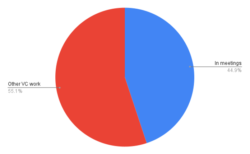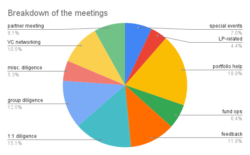Hello and welcome back to our blog series on life sciences VC! For this last entry, we will briefly talk about themes in a life science venture capitalist’s day to day life on the job and their various experiences.
From the interviews, we have found 3 major themes that define the on the job experience of a life science venture capitalist:
- Discovery
- Support
- Work-life balance


Figure 1: A day in the life of a VC
Discovery
No matter your position in a VC firm you are always learning. Whether that be through due diligence, reading scientific literature, giving presentations, meetings, etc… It almost feels like you are doing a PhD! If you refer to the pie chart above, you can see the different types of meetings someone can have in a typical day (Fig 1). A VC firm’s ultimate goal is to invest in companies they believe will be successful. To build a good investment profile, they need to know where the new and innovative ideas are brewing. Through this analysts are able to communicate to scientists and manage relationships with other life science institutions.
Support
Along with research, life science venture capitalists also play a key role in supporting the scientists they are investing in. This mainly comes in the form of helping their scientists get funding or collaborations. A VC may typically go out to meet third party partners or investors to help fundraise for their projects or scout potential collaborators. Both funding and collaborations play a key role in helping scientists continue their research as well as enter the industry. Scalability, marketing strategies, IP, licensing are all areas venture capitalists work on to support their partners.
Work-Life Balance
You may be wondering what the work-life balance looks like as a life science venture capitalist. Though this will vary between firms and individuals, it generally seems to tip to the unbalanced side. One interviewee described the job being difficult to “turn off”. Constantly being available for meetings and putting together presentations is really important for this industry. The job is definitely difficult, however most firms have support staff to ensure everyone is getting the help they need. Also, most firms have clear paths for progression and therefore most people work in VC for a few years then switch career paths. From research to support, all the different roles and tasks you do in VC quickly teach you transferable leadership and mentoring skills, opening the path to many new doors.
With the many different types of opportunities available in VC there is a place for everyone to learn and build exciting scientific companies. ✨
Click here to go back to the landing page!
Blog post by Sarah Acolatse.
Published September 2021.
